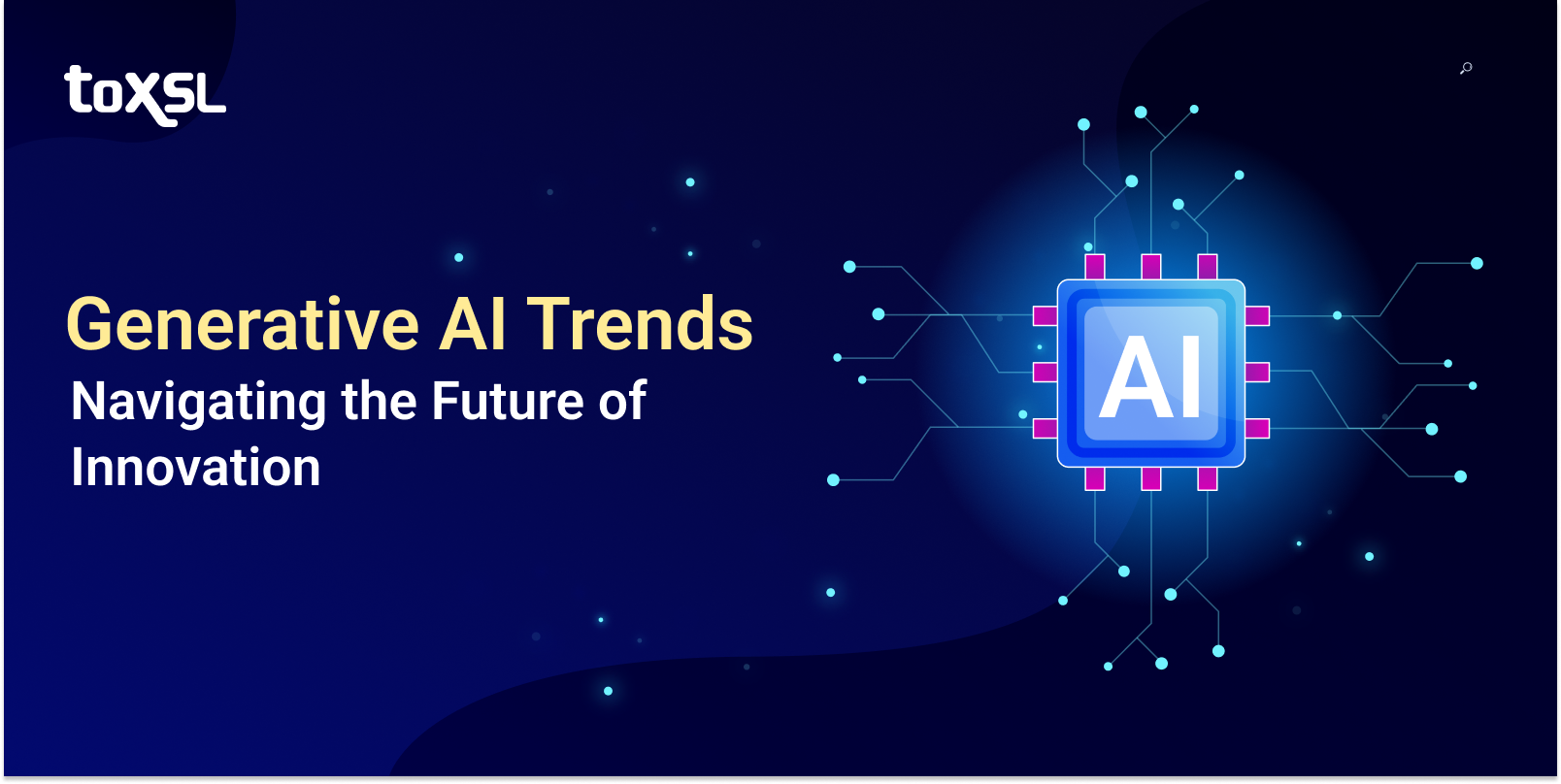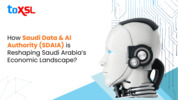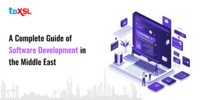- Dec 03, 2024
- Generative AI
- 2761
Share this post on:

Artificial Intelligence is undergoing a major change with the rise of various models, including BERT, DALL-E, and GPT-3. We can see a huge shift from data-driven AI tasks to creative tasks using Generative AI. Last year, the media announced the year as “The Year of Generative AI”. With that, Bill Gates announced Generative AI as the most significant technological advancement in decades. We believe that this blog will provide you with an entry point to this technology and help you understand the trends and applications associated with Generative AI. Before moving further in this blog, let us first dive deeper into the stats and learn what is happening in the Gen AI space:
The worldwide market for Generative AI has a massive valuation of $44.89 billion.
- According to Statista, the Gen AI market is predicted to exceed $66 billion by the end of 2024.
- Bloomberg Intelligence says that the Gen AI market can reach $1.3 trillion by 2032.
- An overwhelming majority, 92%, of the renowned Fortune 500 companies have embraced Generative AI solutions.
- Generative AI tools have gained significant traction among the Gen Z population. 70% of Gen Z is experimenting with Gen AI.
- A report says that by the year 2025, 95% of customer interactions will involve the use of AI, revolutionizing the customer experience.
- Generative AI has found widespread adoption in marketing departments, with 73% of them leveraging its capabilities.
Now that we have learned a lot about the market value of Gen AI. Let us now move further in the blog and see what trending in Generative Artificial Intelligence in 2024.
Generative AI: What’s Trending
Generative AI is expected to play an important role in bringing businesses’ vision to life. But how? What are the top trends in Generative AI? How will Generative AI help businesses unlock the value from data? Let’s now shed some light on the Generative AI trends:
Enhancement in Multimodality
A multimodal is a Machine Learning model that processes information from various modalities, such as images, videos, and text. With the hype of Gen AI, these models are gaining massive popularity and are becoming the priority of businesses. The multimodal model was first released by Open AI named GPT-4, followed by Google’s Gemini and Anthropic’s Claude 3. Moreover, there are a lot of Artificial Intelligence Services provider companies that have not made multimodal models available to the public. Furthermore, we can expect multimodal models to grow in complexity and precision. This includes improvement in the quality of images, and non-text outputs, adding file attachments like Claude 3, and working with internet search engine widgets like Gemini.
AI-as-a-Service (AIaaS)
AIaaS is a cloud-based service offered by third parties that allows businesses to incorporate AI into their systems. AI as a service is rising in popularity across usinesses that want to opt for AI and develop services using Artificial Intelligence. However, with the advancement in AI and the adoption rate of generative AI, businesses are willing to integrate AI, but not all businesses are well-versed in the technology. Hence, they take help from third-party AI services. These services help businesses boost team productivity, and efficiency, and reduce cost. Some popular types of AIaaS are bots and virtual assistants, Machine Learning frameworks, Application programming interfaces, and AI of Things.
Research on AGI
The field of Gen AI has taken an important place in research and practice across various disciplines. Artificial General Intelligence is a concept of AI outperforming humans in most tasks and critical thinking assignments. Even though we haven't reached a point where we do not know what AGI looks like, or how AI experts will know if they have or not reached to point of AGI. The future is AGI and most research will revolve around this technology. However, AI leaders may not reach the true AGI in upcoming years, but Generative AI will continue to thrive and will help businesses grow exponentially.
Enhancement in Security
As companies are constantly opting for Gen AI in their systems, businesses are highly likely to invest in services, policies, and AI technology. But this may raise the higher security concerns. Even though a small number of companies are focused on improving their business with AI, as the usage increases, the fear of security grows too. Hence, all the companies using AI will start operating with AI policies to protect themselves against major liabilities and damages.
Increased Focus on Quality
As regulatory bodies and businesses start to find stolen, dangerous, or inaccurate content developed using Gen AI, there will be pressure on all AI companies to improve their data. Creating quality data will further help AI companies to market properly and maintain their reputation.
General Generative AI Applications
Generative AI has the potential to significantly impact numerous industries. Taking the different layers of Gen AI into account, the progression in Gen AI can further develop new platforms and applications centered around Gen AI. Here are a few applications of Generative AI.
Creative Industries
Generative AI models have already made significant strides in the creative realm. Artists, writers, and musicians are exploring the use of these systems to generate novel ideas, concepts, and content. AI-generated art, poetry, and music have already gained recognition, showcasing the creative potential of these models. Additionally, generative AI can assist in content creation for advertising, marketing, and entertainment industries, providing a wealth of fresh and engaging material.
Education and Research
The ability of generative AI to synthesize and present information coherently and engagingly holds immense potential for education and research. AI-powered tutoring systems could tailor educational content to individual learning styles and needs, enhancing the learning experience. Furthermore, generative models can assist researchers in exploring new hypotheses, generating novel ideas, and accelerating scientific discovery across various disciplines.
Healthcare and Biotechnology
Generative AI has the potential to revolutionize the healthcare industry by aiding in drug discovery, personalized medicine, and medical imaging analysis. These models can be trained on vast amounts of biomedical data to generate novel drug candidates, predict disease progression, and assist in accurate diagnoses. Additionally, generative AI can be employed to create synthetic patient data for research and training purposes while maintaining patient privacy.
Content Generation and Media
The media and entertainment industries are exploring the use of generative AI for content creation, storytelling, and personalisation. AI-generated scripts, novels, and screenplays could become commonplace, offering fresh and diverse narratives. Generative models can also be used to create personalised content recommendations, tailored to individual preferences and interests.
Customer Service and Conversational AI
Generative AI has the potential to enhance customer service experiences by powering conversational AI assistants. These assistants can engage in natural language conversations, understand context, and generate relevant and personalized responses. This capability can improve customer satisfaction, reduce response times, and streamline support operations across various industries.
Bottom Line: Future of Generative AI
In this blog, we have attempted to make you understand how the trajectory of Gen AI can change in the future. Well, this doesn’t stop here, let us make it clear that this is just the beginning of a paradigm shift in AI. It remains to be seen how these applications and trends in Gen AI will keep finding a place in everyday life. Moreover, the advancement in Gen AI keeps on growing and the trends we see today will sooner or later become the talk of the past. Hence, businesses must understand the importance of growing with technology. If businesses want to scale in today’s time, it is high time for them to adopt Gen AI in their solutions or services.
So, if you are looking to continue standing out in today’s competitive market, contact ToXSL Technologies–a renowned Generative AI company in Dubai. We are always a step ahead of our competitors and believe in offering top-notch Generative AI solutions. ToXSL Technologies carries more than 12 years of experience, we have proved our expertise among businesses, which in turn made us the mobile app development company in Dubai. Invest in our services and let us help you develop an award-winning business. Contact us today.
FAQs
1. What is generative AI and why is it important?
Generative AI refers to a subset of artificial intelligence that uses machine learning algorithms to create new content, including text, images, music, and more. Its importance lies in its ability to enhance creativity, automate content generation, and streamline workflows across various industries, significantly boosting productivity and innovation.
2. What are the current trends in generative AI for 2024?
Key trends in generative AI for 2024 include:
- Increased Adoption: Usage has risen from 55% in 2023 to 75% in 2024 among organizations.
- Higher ROI: Companies report an average return on investment (ROI) of $3.7 for every dollar spent on generative AI, with top leaders achieving $10.3.
- Customization: Many organizations plan to move beyond out-of-the-box solutions to develop custom applications tailored to their specific needs within the next two years.
- Multimodal Capabilities: Generative AI is evolving to handle multiple data types (text, images, audio), enhancing its versatility and applications.
3. How is generative AI impacting various industries?
Generative AI is transforming multiple sectors by automating tasks, improving decision-making, and enhancing customer experiences. Industries such as financial services, healthcare, retail, and manufacturing are seeing substantial ROI and operational improvements through its implementation. For instance, it aids in medical imaging analysis and personalized customer interactions through chatbots.
4. What challenges do organizations face when implementing generative AI?
Organizations encounter several challenges when adopting generative AI, including:
- Skill Gaps: A lack of technical expertise among employees can hinder effective implementation.
- Data Privacy Concerns: Risks related to data breaches and ethical considerations are significant concerns that require careful management.
- Change Management: Successfully integrating generative AI into workflows necessitates a cultural shift within organizations and effective leadership to guide employees through the transition.









